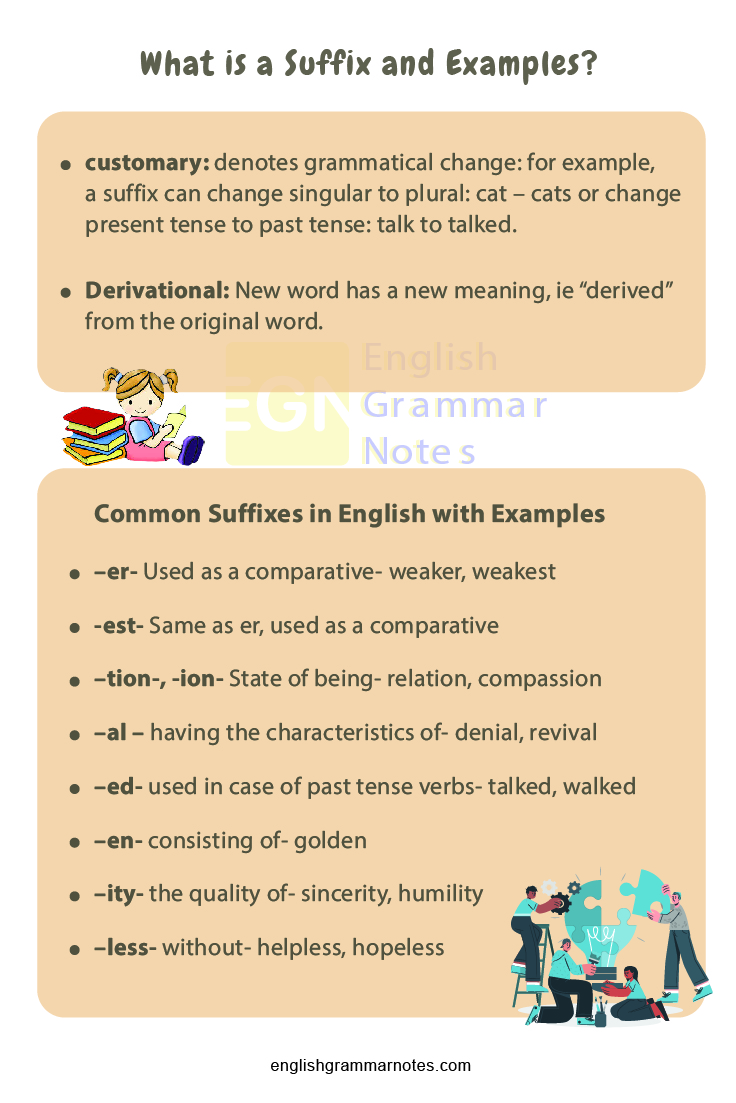One of the easiest ways to enrich your vocabulary is to learn about suffixes. A suffix is a sequence of letters placed at the end of a root word. For example, ‘-ful’ is a suffix that we see at the end of words like ‘thankful’, ‘sucessful’, and ‘beautiful’. This suffix implies ‘full of’ or ‘characterized by’. So when you say something or someone is ‘beautiful’ you imply that it is full of beauty!
The most commonly used suffixes in English include: include ‑ous, -ness, -able, -al, -ed, -ity, -less, -ly, -ment, -ious, -es, and -s, er, -en, -est, -ful, -ing, -tion.
- What is a Suffix and Examples?
- Common Suffixes in English with Examples
- Why do you hyphenate Suffixes?
- Function of Suffixes
- Rules to follow in the Usage of Suffixes
- Things to Remember while Adding Suffixes
- What are some of the common Suffixes used in English?
- Distinguish between a prefix and a suffix?
- What is the meaning of the prefix ‘able’?
- Give any five examples of suffixes?
What is a Suffix and Examples? | Suffix Definition & Meaning
A suffix can create a new word in the following ways:
- Inflectional – denotes grammatical change: for example, a suffix can change singular to plural: cat – cats or change present tense to past tense: talk to talked. In both of the above-mentioned cases, the basic meaning of the word stays the same.
- Derivational – New word has a new meaning, ie “derived” from the original word. Examples:
Care-Careful
Teach- Teacher
Sing- Singer

Common Suffixes in English with Examples
Given below is a list of the common suffixes used in English:
- –er- Used as a comparative- weaker, weakest
- -est- Same as er, used as a comparative
- –tion-, -ion- State of being- relation, compassion
- –al – having the characteristics of- denial, revival
- –ed- used in case of past tense verbs- talked, walked
- –en- consisting of- golden
- –ity- the quality of- sincerity, humility
- –less- without- helpless, hopeless
- –ly- characteristic of- lovely, sincerely
- –s-, -es- suggests the meaning of more than one- apples, mangoes
- al- denotes a process- arrival, burial
- ism- refers to a theory- capitalist, socialism.
- dom- state of being- kingdom, freedom
- ive- having the quality of- creative, suggestive
- ship- refers to a position held- kingship, fellowship
Why do you hyphenate Suffixes?
We barely hyphenate suffixes, but given below are some instances in which you may add one:
- A hyphen may be added when a word seems lengthy without one. Example: community-wide
- When the suffixes used are -like, -type, -elect, an hype is added. Example: scholarly-like
- When the last letter of the suffix is the same as the first letter graffiti-ism, past-tense, etc.
Do Read:
Function of Suffixes
Suffixes play an important role in English Vocabulary. The following are some of the functions of a suffix:
- A suffix cannot be considered a word, but it adds to and transforms the meaning of a root word, making the word longer.
- Suffixes also indicate the way a word is used, formed, and converted into another word that has a different meaning to suit the context.
- A suffix transforms the grammatical role of lexis. It changes nouns into adjectives or makes verbs out of nouns.
Rules to follow in the Usage of Suffixes
Rule 1: On adding the suffixes –ness and –ly to a word, the spelling of the word does not alter
Examples:
- sad + ness = sadness
- scholar + ly = scholarly
Exceptions to Rule 1: When a word ends in y, it’s necessary to change the y to i before using the suffix –ness and –ly.
Examples:
- happy + ness = happiness
- ready + ly = readily
Rule 2: When the suffix starts with a vowel, the silent e in the root word is dropped.
Examples:
- use + able = usable
- write + ing = writing
Exceptions to Rule 2: If the word ends in ce or ge, keep the silent e in case the suffix starts with a or o.
Examples:
- courage + ous = courageous
- replace + able = replaceable
Rule 3: When the suffix starts with a consonant, the silent e is kept intact in the original word.
Examples:
- care + ful = careful
Exceptions to Rule 3
Examples:
- argue + ment = argument
- true + ly = truly
Rule 4: If the word ends in a consonant and y, the ‘y’ should be changed to ‘i’ before any suffix except i.
Examples:
hurry + ing = hurrying
Rule 5: If the suffix starts with a vowel, double the final consonant. This happens only if
- The word consists of only one syllable or is accented on the last syllable
- The word ends in a single vowel succeeded by a single consonant.
Examples:
One syllable word- tan + ing = tanning
regret + ing = regretting. Here the accent falls on the last syllable and the word ends in a single vowel succeeded by a single consonant. Accent on the last syllable, = cancel + ed = cancelled
Things to Remember while Adding Suffixes
Certain suffixes carry more than one meaning. For example, take the suffix -er. It may refer to a person who acts, like a trainer. But “er”can also be added to the end of adjectives or adverbs. In such cases, it compares two things.
Always keep in mind that the spelling of a root word can alter when a suffix is added.
FAQs on Suffixes
1. What are some of the common Suffixes used in English?
A letter or series of letters placed at the end of a root word is known as a suffix. Some of the common suffixes used in English include er, est, ly, able, etc.
2. Distinguish between a prefix and a suffix?
A letter or series of letters placed at the beginning of a root word is known as a prefix. Example: Take the word interest. The addition of the prefix ‘dis’ leads to the creation of a new word ‘disinterest’ is formed. On the other hand, a suffix is placed at the end of the root word. Example thank+ ful= thankful.
3. What is the meaning of the prefix ‘able’?
A letter or series of letters added at the end of a root word is known as a suffix. One of the common suffixes used in English is ‘able’. It has the meaning ‘able to be done or having a specific quality. Examples include capable, adorable, etc.
4. Give any five examples of suffixes?
ed- danced, played
er- stronger, weaker
es- apples, trenches
able- comfortable, usable
ing- singing, dancing
Conclusion
Understanding the connotations of common prefixes and suffixes can help you grasp unknown English words you come across. It will also help you become better at spelling words. Hence if you are familiar and well-versed in suffixes, enriching your vocabulary becomes an easy task.
A wide variety of English Grammar Notes and rules along with enough examples is available for students right from beginner to advanced level and can be downloaded for free.
